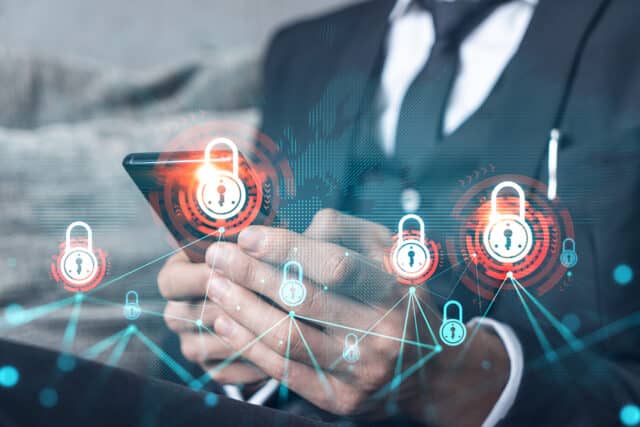Guarding your digital realm: Navigating the era of encrypted messaging and secure communication tools

In our modern hyperconnected world, we are constantly sending emails, instant messages, SMS messages, chats on social media, and much more to send information professional and personal. As each aspect of our lives continues to become digitized -- and as cybercrime gets ready to reach more than $10 trillion by 2025 -- it's becoming more important than ever to use encrypted messaging and secure communication tools to preserve our privacy.
Guarding your digital realm is thankfully more than viable with encrypted messaging and secure communication, in particular technologies such as end-to-end encryption, decentralized messaging platforms, and advanced privacy-enhancing features. To that end, let's talk about how these pioneering tools are playing a crucial role in protecting individuals, businesses, and journalists from cybercrimes.
We'll also discuss how adopting encrypted messaging and secure communication tools can act as a bulwark against breaches, as well as the importance of prioritizing and rethinking digital privacy and advocating for a wider awareness of secure communication.
Why individuals and businesses need secure communications
Both businesses and individuals need secure communications to securely exchange information with employees, business associates, financial institutions, friends, and much more. Without a means to ensure secure communications, it is impossible to maintain any level of privacy or integrity of data during the exchange of information.
End-to-end encryption: what it is & how it protects your privacy
End-to-end encryption is a type of encryption method that uses keys (meaning it's a type of asymmetric encryption) to encrypt and decrypt data. End-to-end encryption protects privacy and ensures data security with the help of private and public keys, as opposed to symmetric encryption methods that only use one key to encrypt and decrypt data.
Various popular digital communications tools such as WhatsApp and Google Fi use end-to-end encryption to make sure that nobody is snooping on your messages or rummaging through any of your data. The main advantage that comes with end-to-end encryption is that an individual's or business's system provider is unable to access any decryption keys with which to access key files or emails.
End-to-end encryption is also likely to be highly useful in tackling the growing problem of business email compromise (BEC). This is because end-to-end encryption can prevent cybercriminals from hijacking conversations between companies and customers, and it can keep bad actors who are using legitimate business email addresses from targeting an employee also working at that business.
Don’t be afraid to embrace decentralized technology
As you're likely well aware at this point, concerns have never been greater when it comes to data privacy and ownership. To address these concerns, decentralized social media platforms give users more control over their data by leveraging blockchain technology and decentralized networks. These alternative social networks run on their own servers and don't need to fear being swallowed up by big tech since they don't rely on the public cloud.
A big draw for lots of people using decentralized social media platforms in 2023 is the emphasis on uniqueness in community; certain popular decentralized social platforms like Mastodon use various servers that are all connected, referred to as instances; someone using a platform like Mastodon can pick an instance they feel aligns with their interests, thereby becoming entrenched in a community of likely like-minded individuals.
The future of decentralized social media platforms may very well impact online communication as a whole. Decentralized technology's use of blockchain technology makes for a robust combination of data privacy and security features that other, more mainstream social media competitors with platforms that do not use interconnected servers must take seriously. Additionally, decentralized social media platforms are more conducive to censorship resistance and give users a greater level of control over their experience online.
The future of secure communication
With each passing day, our world begins to appear more like one giant digital landscape. The solutions that can rise to the challenge of securing our modern digital landscape will likely make use of end-to-end encryption, secure networks, and authentication protocols that ensure only the right people can access the data they need at a certain time. It's incumbent on business owners to stay abreast of trends in secure communication technologies and standards so that they can keep themselves - and their business and its employees - safe from cybercrimes.
Emerging trends and technologies in secure communication
Given its recent and explosive popularity across seemingly every aspect of daily life, it should come as no surprise that artificial intelligence is a key player in the area of secure communication. AI is the key to reliably and consistently detecting and preventing data breaches as well as recognizing patterns in datasets that can help businesses glean valuable insights. On the more user-oriented side of things, AI can improve the way secure communication tools work and allow users to enjoy more personalized experiences.
Additional emerging technologies like blockchain and especially end-to-end encryption may soon be incorporated into commonplace software applications such as video and voice calls. End-to-end encryption is particularly important to keep track of when following trends in secure communication because of its ability to strike a fine line between usability and security: users don't need to worry about their data being encrypted and decrypted as they send and receive messages.
Should you be using an encrypted messaging application?
These days, there's little to lose from using an encrypted messaging application to help increase your privacy and make it harder for people to snoop on you and your private conversations (and any of the businesses or personal acquaintances that are involved). In fact, most high-quality encrypted messaging apps are encrypted to the point that they make it difficult for law enforcement to access them (which has, admittedly, caused some problems in the past).
If you're looking for an alternative solution to SMS and MMS messaging that prevents your messages from being viewed by your system provider or other third parties, it may be a good idea to consider using an encrypted messaging app. An encrypted messaging app will do a better job of keeping personal or professional information from being intercepted -- it's a good idea to use an encrypted messaging app if you're regularly sending and receiving potentially sensitive personal or business-related info.
Conclusion
In the ever-connected digital world, encrypted messaging and secure communication tools are becoming pivotal in preserving our privacy. The intricacies of end-to-end encryption, decentralized messaging platforms, and innovative technologies like AI are playing a crucial role in protecting individuals, businesses, and journalists. With privacy threats looming larger than ever, it's imperative that these security measures be adopted by individuals and businesses to prevent data breaches from occurring.
Image credit: videoflow/depositphotos.com

Lee Li is a project manager and B2B copywriter with a decade of experience in the Chinese fintech startup space as a PM for TaoBao, MeitTuan, and DouYin (now TikTok).
